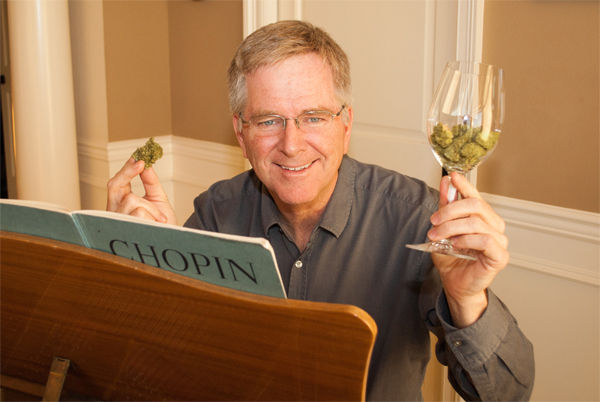Drug Policy Reform and Decriminalizing Marijuana
By Rick Steves
With my work on the ACLU-produced TV program Marijuana: It's Time for a Conversation, support of NORML (a group working to decriminalize marijuana in the USA) and willingness to talk at Seattle's Hempfest as well as at other events, some people are wondering what's motivating me. Let me explain:
I support the decriminalization of marijuana among responsible adult users in the USA. ("Decriminalization" does not mean unfettered use — it simply means NOT mandating that use is a criminally punishable offense.)
I do NOT support the legalization of hard drugs.
Like most of Europe, I believe marijuana is a soft drug (like alcohol and tobacco), not a hard drug. Like alcohol and tobacco, it should be treated as a health rather than a criminal issue. Crime should only enter the equation if it is abused to the point where innocent people are harmed.
I do not support children using marijuana (or alcohol or tobacco). In fact I don't advocate smoking marijuana at all. I believe, however, that if mature adults want to smoke marijuana recreationally in the privacy of their own homes that is their own decision. That's why Nadine Strossen, president of the ACLU, Norm Stamper, former Seattle police chief, and I serve together on the board of directors of NORML.
Why do I care?
Last year over 800,000 Americans were arrested on marijuana charges — a 100% increase since 1980. Well over 80% of these arrests were for simple possession. Many of these people were sentenced to mandatory prison time. Our courts and prisons are clogged with non-violent people whose only offense is smoking, buying or selling marijuana. While our nation is in a serious financial crisis, it spends literally billions of dollars annually chasing down responsible adults who are good, tax-paying citizens in all regards except for the occasional use of marijuana. Arresting people for marijuana use is laughable now in most of Europe. Canada is now following the European model. After 10 years of treating marijuana as a medical issue rather than a criminal one in the Netherlands, law enforcement officials there report no increase in the use of pot. They also report that by decriminalizing marijuana, the crime related to it simply evaporates. "Harm reduction" is the measure of an effective, pragmatic, and enlightened drug policy in Europe and Canada.
The propaganda war our government wages against the use of marijuana is not only expensive in terms of money but it erodes its credibility among young people in regards to other more serious drugs. The White House even runs ads during the Super Bowl claiming (between all the beer ads) that marijuana causes teen pregnancies. As it has politicized science and medicine and so much else in our society, the White House has recently sent a summary of the evils of marijuana to all prosecutors in the USA with a litany of entirely false claims. These are refuted one by one at www.norml.org.
With the tenor of our country right now, dealing with the prohibition on marijuana is considered political suicide for most elected officials. Teachers I know tell me they will put their jobs in jeopardy if they question the deceitful (and generally considered somewhere between ineffective and counterproductive) DARE program, which indoctrinates children about the evils of marijuana. Average Americans embrace this big lie because it is scary to question it. I refuse to lie to my children about a fun soft drug that the majority of my friends and workmates have enjoyed at some time in the past. I have explained to my children my position on the senselessness of continuing this expensive and counter-productive war on marijuana users. They respect my honesty and I have won credibility in their eyes.
The credibility of parents, teachers, police, and our government is important if we are to help our children resist the temptation to mess their lives up with drugs. Credibility on all counts suffers with the current "war on marijuana."
We've been there.
Prohibition on alcohol (1920–1933) finally fell apart in our grandparents' age because Americans came to realize that the criminalizing of alcohol did not reduce its consumption. But did succeed brilliantly in: filling jails with unlucky drinkers who got caught, creating a stubborn network of "underground distribution" crime where none had existed before, and diverting enormous government resources to violate people's personal privacy. Prohibition was a classic example of a hoped-for cure that brought more harm to society than the problem it was designed to tackle. It was Big Government at its worst. And our grandparents courageously stood up and said, "stop this waste!" In the early 1930s, our society didn't say booze is good. It concluded that criminalizing it only made the problem worse. Looking back, we know that was the right conclusion.
With the prohibition on marijuana, we are dealing with a similar problem today. In the name of life, liberty, and the pursuit of happiness, we'll all be better off when we let our police officers, courts, and prisons deal with real criminals and start taxing marijuana rather than arresting those who enjoy using it.

